These stories show the reality for individuals with disabilities.
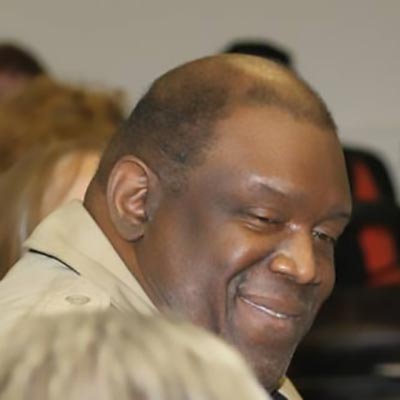
Brian’s Story
Brian is 54 years old and has always lived with his mom. His mother’s care is all he knows and all he has ever experienced. Brian is fully verbal and for the most part can take care of himself despite his intellectual disability. Brian and his mother did not receive any support from the city. No one stopped by the house to check on him and his elderly mother.
Read More
Living in the same house his whole life he knows the neighbors and he knows where the neighboring funeral home is. Brian knows that when someone dies you need to go to a funeral home. What Brian does not know is to call 911 when someone falls, or how to arrange a funeral or how much it costs.
We received the following information from a medical examiner.
On October 6th, 2011 Brian’s elderly mother fell down the stairs. She landed at the end of the stairs and could not move. Brian did what his mother has done for him many times before; he made her food and tried to feed her for days. It’s estimated his mother passed away on October 9th still at the bottom of the stairs. Brian sat with his deceased mother at the bottom of the stairs for 8 days. On October 14th Brian walked to the local Funeral Home one block from his house to inform the proprietor his mother died. The undertaker contacted the medical examiner’s office. The forensics unit carried the decomposed body of Brian’s mother from the home.
There is no family involvement whatsoever. Brian doesn’t have any contact information to any relatives. He said his mother has a phonebook somewhere in the house, but he is not sure where. The only individuals who are aware of her passing are the police, medical examiners and a few neighbors. This left Brian alone, without help or services and support.
Debbie’s Story
Debbie was born with Downs Syndrome to loving parents who not only accepted and understood her disability, but also extended it by adopting another disabled child, Susan. Susan, just like Debbie had Downs Syndrome, and in addition, a heart condition that required care.
Read More
Following the heartbreaking passing of both of Debbie and Susan’s parents, their new caretaker was Debbie’s birth sister, Terri, her husband Ed, and their children. Living in their care Debbie and Susan were introduced to a new life that no one ever should ever experience. In the home of their sister, Debbie and Susan were locked in a basement while Terri and Ed were often high on drugs. The sisters lived in fear of their new caretakers, terrified of Ed’s gun and temper.
While locked in the basement, they were surrounded by dirty clothes and trash, and slept on hospital beds. They were given sparse amounts of food and did not receive any of the medication or professional care they required. Susan suffered significantly due to her heart condition, requiring oxygen she would never receive. She wasn’t bathed, and couldn’t feed herself. These responsibilities fell to Debbie, who also needed help and care. It was a sister’s love that allowed Debbie to care for Susan, sharing what little food she had, exhausting all her energy to clean her, often injuring herself struggling to get to the basement door.
Her young niece, seeing the pain they endured, offered to remove them from the basement, but was told “no” by her parents, removing them would mean the end of the social security checks they received in Debbie’s and Susan’s name. On November 14, Debbie faced her next trial, the passing of her sister Susan. In the dark, dirty basement of their sister, Susan passed away with Debbie by her side. For three weeks the sisters were together side by side, one dead and the other just barely alive. When Terri and Ed lost their house due to their drug abuse causing financial problems it was the first time the serious issues came out in the open. For over a year Terri and her husband used Susan’s and Debbie’s social security checks to feed their drug abuse. People in Debbie’s and Susan’s surrounding knew the situation was bad, but it was little they could do with no legal backing. On Christmas, when the house was entered for repossession and Terri, her husband and their children were long gone, Susan finally after three weeks, received a proper burial.
It is now seven years later, and Debbie is able to share her story with the world, but it is not without regret that we listen. She is a strong incredible woman, and after many, many years of support she has moved on. She now is happily living in a group home, once again surrounded by people who loves and cares about her.
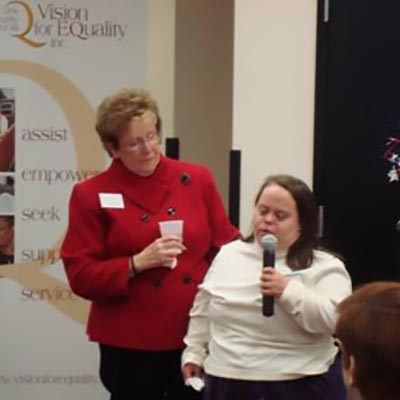
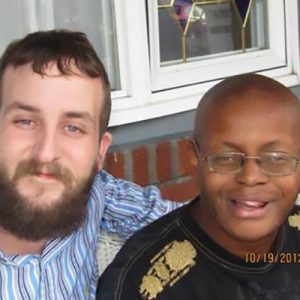
Derek’s Story
Thirty-seven year old Derek and his mother were like two peas in a pod. If you saw one, you saw the other. Derek cannot cook, grocery shop, get to his doctor’s appointments, or clean without help, and he needs constant reminders to take his medications. Derek can be very naïve, which makes it easy for people to take advantage of him. Several times he gave away his entire paycheck leaving him with nothing to eat.
Read More
When Derek’s mother passed away on May 11th, 2012, Derek’s life took a chaotic turn. Sadly, Derek’s extended family was never involved in his life and after his mother passed this did not change. A few months after he lost his mother, Derek developed a malignant tumor lump along his jawline. Derek needed immediate surgery.
Even though Derek had a job and his employer provided great health insurance and even though Derek needed immediate surgery, he was met with another stumbling block – the doctors determined that Derek could not grasp the concept of the procedure and was not competent to sign the release forms.
The cyst continued to grow and became life threatening. Vision for Equality was called to help and immediately arranged for Derek to be taken to the hospital. The hospital insisted that a family member or guardian sign consent forms for the surgery and subsequent treatment. Since Derek’s family was not involved, Vision for Equality assumed temporary guardianship for medical decisions only so that Derek could get the treatment he needed without further delay. Derek had the tumor removed and received chemotherapy. Vision for Equality arranged for Derek to receive the daily support he needed to recover and move forward.
The tragic series of events that occurred in Derek’s life over the past few months could not have been avoided completely, but could have been handled much differently. Thanks to the help from Vision for Equality, Derek is now facing a brighter future. Derek is now receiving the support he deserves and is well on his way to good health and resuming his productive role in the workforce and in the community.
Steven’s Story
Steven is a 26 year old man who needs total care. He uses a wheelchair, is non-verbal, and has other significant physical disabilities. Approximately, two years ago, Steven’s nursing was increased to 24/7. This was necessary for his health and safety. He requires 24 hour awake care resulting from seizures, aspiration, medication administration and positioning. He also now needs CPAP and oxygen to sleep.
Read More
It is clear that Theresa also needs to sleep and work and cannot provide overnight support. Yet, 24 hour nursing care is “pending” until the state decides if it is necessary.
When Theresa suggested that she needed to continue the 24/7 nursing, it was recommended to her that she choose a $400,000 Residential Placement. Theresa maintains a beautiful, happy home for her sons and wants him at home where she can love and care for him.
Steve was denied 24/7 nursing care. This decision has been appealed.
Steven’s mother maintains employment to support Steven and her other young son. The anxiety of waiting for a decision, which will drastically change her life, is very stressful. If the 24/7 nursing care is not approved his mom, a single care giver she will no longer be able to work the necessary hours to provide financially for her family.
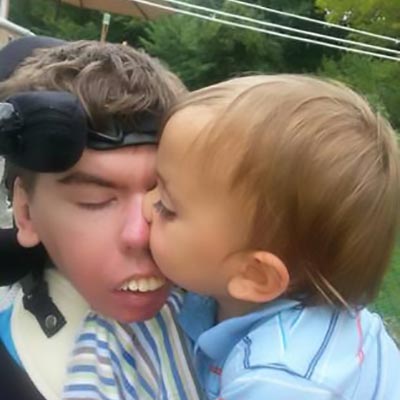
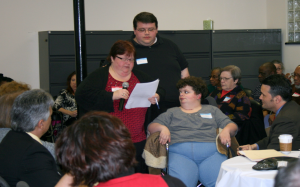
The Costello Family Story
Carol Costello is a single mom taking care of her daughter Colleen.
Vision for EQuality is assuring that Colleen is receiving services to live a rich and full life in the community. This also permits Carol and her son Mark to be able to have a job and work.
Read More
My name is Carol Costello, and my daughter Colleen is profoundly intellectually disabled. She is 26, and I have been her primary caretaker for her entire life. I am now a single mother so the task is even harder now.
Through my hard work, and the hard work of our family and friends, Colleen graduated high school at age 21 and transitioned seamlessly into a day program, We were able to avoid institutionalizing her, which doctors have suggested, and instead helped her to be an active member of our family and community. She has a consolidated waiver, which allows us to hire a small group of home and community staff, expanding Colleen’s social circle while relieving some of our burden at home.
We are blessed to have all that we have, but getting all of it required years of hard work and overcoming countless impossibilities. We started securing Colleen’s services when she was very young because we were terrified. The cut being discussed today are specifically what we were afraid of a day when we would lose all that we’ve fought so hard and so long to achieve.
If Colleen lost funding for her services, I would have to quit my job to take care of her, which would cripple us financially especially now that I am a single mother and have to work to take care of my family. She would spend every day of her life sitting in our living room, staring at the TV or out of the window, because we would become financially unable to provide her with day or community activities.
Colleen is 26-years-old, and like any young person, or any person at all, she deserves as rich and full a life as possible. Losing our funding would be damning her to bleak and meaningless inactivity, and would undo decades of work done to make sure that Colleen’s life and livelihood would extend past high school. Budget solutions that dehumanize people are no solutions at all. Please remember not just people like Colleen but their families as well: it will never be easy to care for someone like Colleen, but without services, it will be impossible.
A Family for the Holiday
This Christmas holiday had a very special meaning for a gentleman known to Vision for Equality’s, Consumer/Family Satisfaction Team. He has truly journeyed home for the holidays! He is a person that CFST has been involved with for over 20 years as he left Embreeville State Center and entered a program supported by Horizon House.
Read More
Over the past years he worked hard to align himself with personal goals, worthwhile employment, and a sense of forward momentum. He shared housing with 7-9 other men in a large group home setting. Getting along, being heard, and the feeling of safety were areas in his life that didn’t all exist at the same time, as one thinks they should. Nonetheless, this young man soldiered on to hammer out the best life he could, given his circumstances. After several years his team began to discuss alternative support systems with him. He clearly wanted a life more customized to who he is as a person, a middle age Afro-American male with distinct tastes and ambitions. But from our lens he seemed trapped in a service system that allow him minimal growth. Although his environment was familiar, it was not satisfying and certainly not gratifying. He may have been able to take an occasional trip or attend a sporting event but he didn’t have the family connection that had escaped him for most of his life. As the team presented options of a smaller group home, he pondered, then he was presented with the idea of a group home with a former housemate, he pondered a little more. When the discussion of Lifesharing came into the conversation, and potentially with a longtime friend who was also a prior staff person. This opportunity seemed to be the best bet yet. Well, after years of planning Dwight Tisdell has parted from his group home and moved into a shared living space with his longtime friend that he calls, “Mom”, Gwen White.
I attended his ISP a few weeks ago in his new home and observed a man so happy and content that it stirred my soul. Dwight told the team, “I love my new life, I am happy, and I feel safe”.
Gwen spoke about all of the layers of support that she and her family have wrapped around him to ensure that not only his transition into lifesharing went well but that he has a home and a community to now call his own. This was the best Christmas gift ever. Dwight watches his sporting games with Gwen and her son, helps around the home where needed, and feels to be a valued member of this family. This is something he had been looking to possess for a very long time.
My hat goes off to Dwight; a man who advocated for what he wanted and found the courage to go after it. We recognize that the very best for him is still yet to come. Their smiles tell the rest of the story…
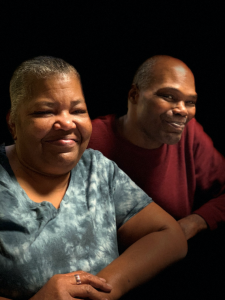
Anthony’s Story
When Anthony was born he was placed on life support after a brain bleed. He wasn’t expected to live. When the life support was removed our battle began to bring him home and help him grow to his fullest potential. Anthony has four brothers who love him but live in the shadow of his needs. He also had a sister who would be 13 had she lived; she was born with Edward’s Syndrome.
Read More
Our hope for Anthony was always to be a part of the family and community the rest of us are, we didn’t put him in an institution, instead choosing to care for him at home despite his profound needs. By choosing this for him we have saved the Commonwealth the hundreds of thousands of dollars institutional life would have cost.
He has multiple disabilities and requires total care. He can’t be left alone. He has a co-occurring mental illness and his needs have increased as he’s aged. Two his siblings have mental illness and my attention as a parent is stretched very thin. Anthony’s father is not active in his life. I can’t hold a full time job because of his needs. I work 4 part time jobs that barely support myself and my children. I forgo my own benefits to keep my schedule flexible to accommodate multiple doctor appointments. Not to mention the hospital stays when he chokes or the times when he misses school because his mental health disorder interferes with his ability to function.
Anthony will be 18 in March. He’s in high school now in an inclusive setting, just as he’s always been educated. He can stay there is his vocational school until he’s 21. I’d love it if he could graduate and obtain competitive employment but with all his needs, this will be a road with many hurdles. He needs consolidated waiver. If he doesn’t have funding when he graduates I will no longer be able to work. There will no one to stay home with him. His two younger brothers and I won’t be able to survive on his SSI check. I’ll lose my house, my car and everything I’ve worked for. Our family will be devastated.
We want Anthony to be productive member of society. I want to remain one and to raise his sibling the same way. Anthony deserves
Britany’s Story
My name is Anita Wright and I’m the parent of two Britany and Martin. Martin is a 17-year-old typical teenager. He also likes talking to his friends on Facebook, Twitter, and cell phones. Martin also enjoys eating and video games. Britany is 22 and she has Retts syndrome, Long QT syndrome, she hearing impaired and has a seizure disorder along with other health issues.
Read More
Britany enjoys being around people, looking nice, eating, and nice-looking men. Britany last two years of high school I was worried if she was going to get the waiver. Britany was on the waiting list for 5 plus years. I did not want her sitting home with nowhere to go or nothing to do. I was writing letters contracting my congressperson my mother congressperson and several other congressional leaders and Britany support coordinators.
During the last year of school, I was informed by the insurance company that on Britany 21st birthday they were no longer covering the nursing services. I panic and cried
I was worried about quitting my job to stay home and take care of Britany. I was worried about how am I going to pay my bills. Where are we going to live? I didn’t know that I had some health issues that I could’ve been aggravated by stress.
The months prior to Britany graduating; I was informed by her support coordinator on Briany 21st birthday she would get the waiver. I was happy but I was also in disbelief. I called the SC supervisor to confirm if Britany did get the waiver and she did.
She was able to start the day program at SPIN in September. Britany enjoys aquatic therapy, bowling, equestrian therapy, dining in the community, going to the theater, concerts in the park, parades, social dances, and art and movement therapy.
If she did not have the services and staff to support her with activities of daily living, Britany would not be the happy young lady she is today. I would not be able to work and provide for my family if Britany services were cut.
Debbie and Susan’s Story
Debbie Borodin was born with Downs Syndrome to loving parents who not only accepted and understood her disability but also extended it by adopting another disabled child, Susan. Susan, just like Debbie had Downs Syndrome, and in addition, a heart condition that required care.
Read More
Following the heartbreaking passing of both Debbie and Susan’s parents, their new caretaker was Debbie’s birth sister, Terri, her husband Ed, and their children. Living in their care Debbie and Susan were introduced to a new life that no one ever should ever experience. In the home of their sister, Debbie and Susan were locked in a basement while Terri and Ed were often high on drugs. The sisters lived in fear of their new caretakers, terrified of Ed’s gun and temper.
While locked in the basement, they were surrounded by dirty clothes and trash and slept on hospital beds. They were given sparse amounts of food and did not receive any of the medication or professional care they required. Susan suffered significantly due to her heart condition, requiring oxygen she would never receive. She wasn’t bathed, and couldn’t feed herself. Those responsibilities fell to Debbie, who also needed help and care. It was a sister’s love that allowed Debbie to care for Susan, sharing what little food she had, exhausting all her energy to clean her, often injuring herself struggling to get to the basement door.
Her young niece, seeing the pain they endured, offered to remove them from the basement, but was told “no” by her parents, removing them would mean the end of the social security checks they received in Debbie’s and Susan’s name. On November 14, Debbie faced her next trial, the passing of her sister Susan. In the dark, dirty basement of their sister, Susan passed away with Debbie by her side. For three weeks the sisters were together side by side, one dead and the other just barely alive. When Terri and Ed lost their house due to their drug abuse causing financial problems it was the first time the serious issues came out in the open. For over a year Terri and her husband used Susan’s and Debbie’s social security checks to feed their drug abuse. People in Debbie’s and Susan’s surroundings knew the situation was bad, but it was little they could do with no legal backing. On Christmas, when the house was entered for repossession and Terri, her husband, and their children were long gone, Susan finally after three weeks, received a proper burial.
It is now seven years later, and Debbie Borodin is able to share her story with the world, but it is not without regret that we listen. She is a strong incredible woman, and after many, many years of support, she has moved on. She now is happily living in a group home, once again surrounded by people who love and care about her.
Harlena and Britney’s Story
Harlena Morton and her husband tried desperately for three years to have a child. After three long years of trying, dreaming, and longing Harlena gave birth to their daughter, Britney. Britney was born with a very rare disease that caused her to not develop certain bones in her body. The doctors informed Harlena and her husband that Britney would not live much longer, and if she did; would never speak or walk. Like many other mothers faced with such a situation, Harlena refused to listen to the doctors and give up on her daughter. Today, Britney is walking and speaking, she is 21 years old.
Read More
Harlena and her husband may have divorced a few years following Britney’s birth, but Harlena has taken care of her daughter and son to this day to the best of her ability. She is a high school counselor at North East High School and has always made sure Britney received the help she needed while ensuring her son was also thriving. Her son is attending college on full scholarship and Britney graduated high school in June, excited to be an adult, and start working.
When Britney turned 21, Harlena received phone call after phone call from insurance companies, medical equipment companies, and the provider of the support personnel Britney worked with for years. They informed her since the insurance coverage expired, the medical equipment would be picked up and removed from her home, and the support person (whom Britney affectionately calls Dr. Girl) could no longer come to help Britney. Harlena spent several years prior to Britney’s coming of age preparing for the struggles she believed may come-but nothing prepared her for the reality that did. It came to be turning 21 meant Harlena and Britney faced one big black hole. Many people called or came, but no one presented a solution. Britney graduated high school looking forward to work. There was none. There was no work, no day program, and no one to support Britney while Harlena was at work.
Harlena has no choice but to leave Britney at home with the mercy of the neighbors stopping in to check on her during the day. During the day, Britney carries the cell phone Harlena got for her and works on the small projects that Harlena has created. Harlena also tries to give her the daily physical therapy she needs to keep progressing.
The only solution the state offers is a state institution. Similar to how she fought off the doctors saying her daughter would never make it; she fights off the people saying her daughter does not belong in their community. Britney has the mental capacity of a five-year-old and has to wear diapers, but she loves people and thrives in social settings. She asks her mom where Dr. Girl is, and when can she start to go to work. That is not the mentality of a person in an institution, miles away from her mother, her sole support system.
Lydia’s Story
Our daughter is 37 years old. She was born without any disabilities but contracted meningitis at the age of four months. It was so severe it led to hydrocephalus which caused extensive brain damage. Her neurologists, who was treating her for seizures, said that I needed to get her into an early intervention program. I enrolled her in an excellent program at Ken Crest in 1975.
Read More
Early intervention programs were at their peak at the time Lydia attended four mornings a week and one day a week they would come out to the house. Lydia was heavily medicated for the seizures at that time and that made progress very slow. By the time she was three, we identified all her disabilities. She is paralyzed on the left side has severe mental retardation, some hearing loss, and legally blind. At that point, we transferred her to the Upsal School for Blind Multiple Handicapped Children. They had intensive therapies; speech, occupational, and physical. They also had a swimming pool and we discovered Lydia’s love for being in the water. Unfortunately, Upsal had financial problems and the School District of Philadelphia took over the program. Soon after that, I noticed that her therapies were being reduced. A friend told me about the Local Right to Education Task Force and I started to attend their meetings. I found out that Lydia was entitled to a Free Apprpopriate Public Education (FAPE) and I pushed for better services for Lydia. The federal government had funds allocated towards specialve education programs, but they never funded it to the level they promised. When I saw how other parents were struggling I became a special education advocate for the next twelve years pushing the school district to look at the needs of children and not their almighty budget. Lydia made great advancements during this time; she learned to sit up when she was five. Several years later she learned to push up with her right leg with me behind her for balance she can stand, walk short distances, and assist with transferring to her wheels hair. She can’t speak but can communicate pleasure’ discomfort and push away when she doesn’t like an activity. She can feed herself with hand over hand assistance. When she was in high school, they didn’t have the skills to handle a child with a visual disability so I fought to get her into Overbrook School for the blind. They helped greatly, but amusingly, they kept telling her that the tray on her wheelchair was her world. With the tray they taught her to sort hot and cold spigots and put them in a box and take large nails from a jig and put them in a box. From the day she graduated, she pushed that tray away from the wheelchair before we could attach it and hasn’t used it since. Now that’s what I call intelligent! When she was a year away from graduation, my friend Maureen Devaney told me about the Consolidated Waiver. I put together Lydia’s transition team of school district personnel, Overbrook staff, the case manager from Mental Retardation Services, Blind and Visual Services, Office of Vocational Rehabilitation and the Hellen Keller Institute. Everything Was set to go if she could get the waiver. Lydia obviously qualified, but her case manager said she had done everything she could and things were standstill. I took the application Included in the waiver packet, filled it out and sent it to Harrisburg myself with a letter stating that Lydia qualifies for this waiver, so give it to her! That shooke them up enough to at least say that they were going to give me a hearing date. Months went by when Harrisburg said I would get a hearing date the following week. Instead, the case manager called up to say Lydia got the waiver. Two weeks later Lydia graduated, she started a day program at COMHAR. It wasn’t the best placement, but at least she wasn’t sitting at home With nothing to do and she wasn’t losing the skills that she learned when she was in school.
Her programs went through a series of changes and she is now at SPIN with her own aide who takes her swimming, roller skating, bowling, shopping as well as activities at the Norcum site. She volunteers once a week at our church by helping to put the church bulletin together.
I’m an only child and my parents lived a block away from us. My mother and I conceived the idea that somedayLydia could live in their house with supports.bas they grew older I had the Philadelphia Corporation for the aging make modifications to the house which included a wheelchair accessible bathroom. Mom and Dad never asked for anything and said they could get along without it ( which wasn’t true), but when I said it would benefit Lydia in the future they were all for it. My husband built ramps for both houses because Lydia went to their home after school when I was working. These modifications allowed my parents to continue to live in their own home and keep their independence as long as possible.
Soon after mom passed, Dan and I started fixing up their house which is now mine. We wanted Lydia to move there because we didn’t want to be one of those horror stories where we die of old age in the house and Lydia is left with no one and at the mercy of the State. We are allowing down and don’t have the energy to keep Lydia actively engaged. We could see she was rather bored in the evenings when we just watch TV, read or use our computers.
After several years of requesting the waiver to allow Lydia to move into her new home, it really happened. Lydia adjusted well; I was a basket case for several months. Lydia has a young energetic staff who takes very good care of her and we can visit whenever we want – if she’s not out of town somewhere. Lydia pays me rent which I put in a separate account for the upkeep of the house. She pays for utilities, food and incidental expenses. The house will go in trust to her after we are gone.
I have spent the last 37 years trying to plan everything in advance for Lydia’s future. I have tried to be cost-effective. The modifications to Lydia’s house have benefitted three people. Now I am scared. I hear that people have lost their waiver because they have been in the hospital for over 30 days or didn’t complete their annual medicine on time. Twelve people have recently been placed in institutions. I have never felt the need to apply for guardianship for Lydia; I will pursue it now because I cannot trust the government to support Lydia appropriately.
Why does the government see our loved ones as second- class citizens? The budget crisis was none of their doing! Why should they suffer for it? I’ve never understood why we have to use a waiver system when the services our loved ones need should be an entitlement. The system keeps looking for ways to reduce or cut services and gives support coordinators a myriad of paperwork for accountability. What about your accountability to us. Protect the most vulnerable citizens in Pennsylvania.
I’d like to close with a quote:
“by his or her presence, here each person attending this meeting shows their support for several things in which I passionately believe, one of them is support for the Constitution of the United States which, written in the recognition that all people are the children of God, made no distinction among them by reason of inconsequential factors over which they themselves had no control.
I believe those of us whop reach so loudly about constitutional government advance our cause as we meticulously observe that particular factor or foundation of that great Document.
Another thing that I have preached, as many others, is against the theory that there can be any second- class citizen. I believe as long as we allow conditions to exist that make for second- class citizens, we are making of ourselves less than first-class citizens.
In other words, I believe the only way to protect my own right is to protect the rights of others.
Everything in the Constitution accords to me, I must defend for others- or else finally there will be nobody left to defend me.”
From remarks at the United Negro College Fund Luncheon on May 19, 1953, by President Dwight David Eisenhower.
Respectfully, Lydia Berger
